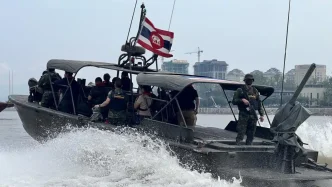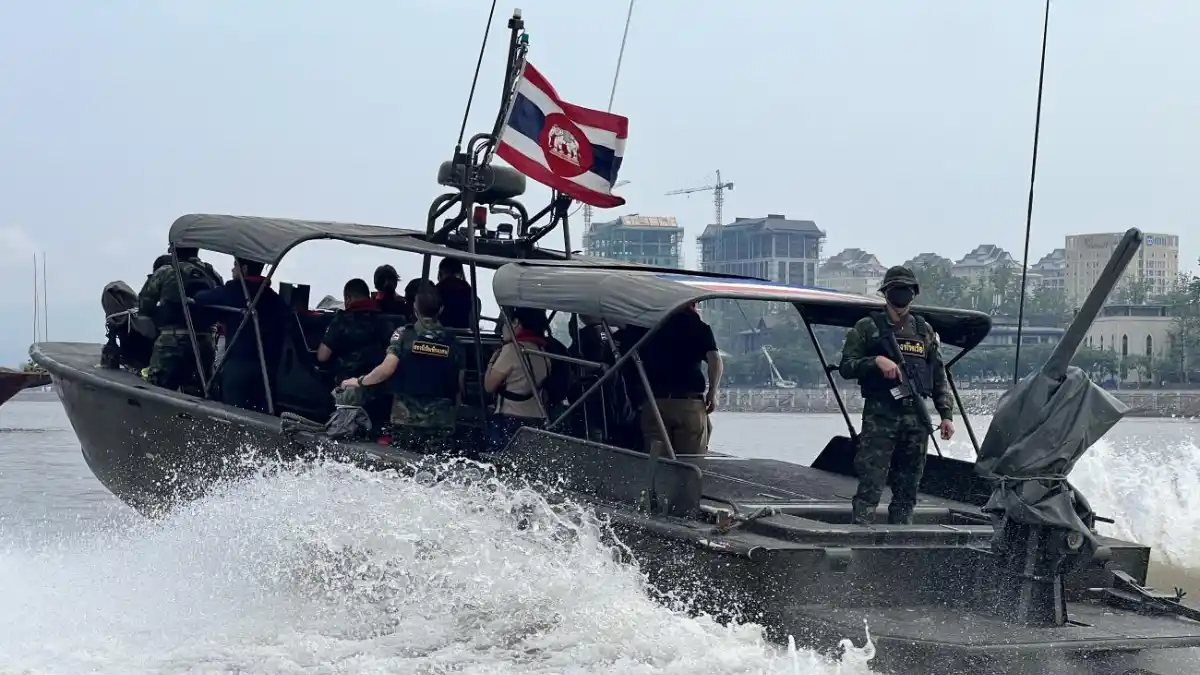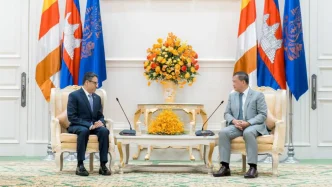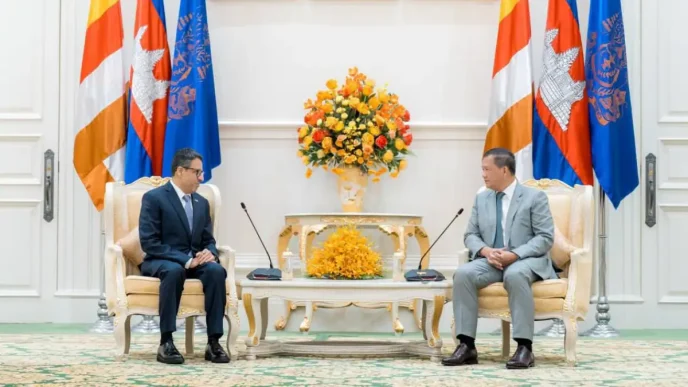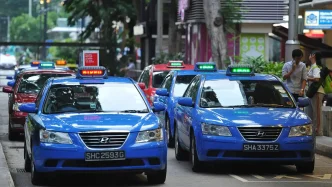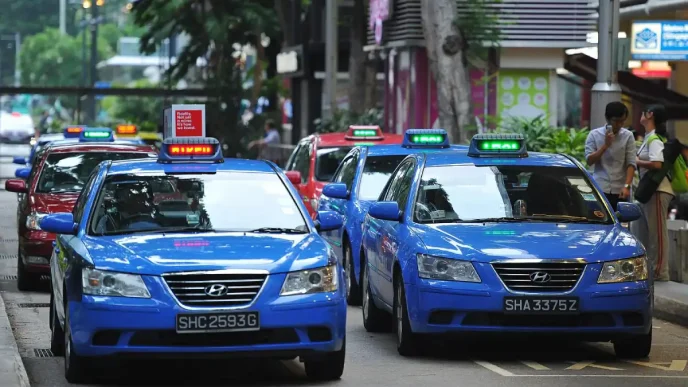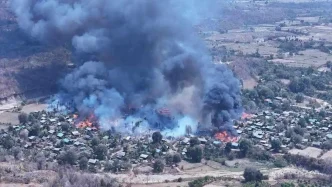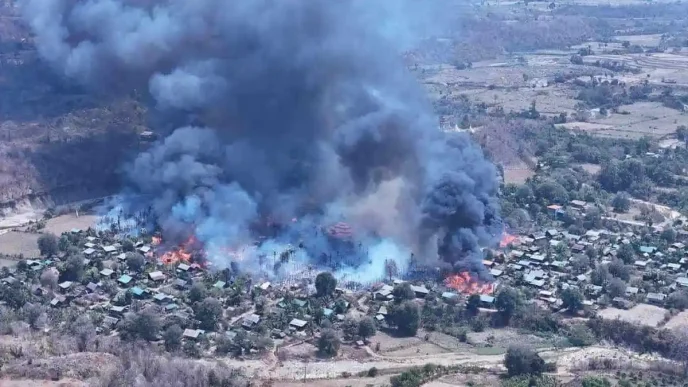In the early hours of August 13, 2025, Thai authorities in Aranyaprathet district apprehended a group of ten Cambodians, including two children, as they attempted to cross the border illegally. Their destination was the Rong Kluea Market, where they hoped to find work washing shoes. With no income to sustain themselves in Cambodia, they had agreed to pay a guide 3,500 Thai Baht (~US$98) each upon arrival. This incident is just one of many recent arrests highlighting a growing crisis: severe poverty and unemployment in Cambodia and Myanmar are pushing thousands to risk dangerous and illegal journeys into Thailand in search of a livelihood.
A Regional Economic Crisis
The economic situation in Cambodia and Myanmar has reached dire levels for many citizens, driving a surge in illegal border crossings into Thailand. Thai officials have reported multiple incidents over recent days, with dozens of individuals from both neighboring countries apprehended while attempting to enter Thailand. The primary motivation, as cited by those arrested, is the lack of employment opportunities and the crushing weight of poverty at home.
In Cambodia, the economic hardship is compounded by political and historical factors. Many workers who had previously sought opportunities in Thailand were encouraged to return home, only to find themselves jobless and destitute. Thai authorities note a decreasing trend of workers returning to Cambodia, with many instead choosing to risk re-entry into Thailand. This desperation is evident in the stories of those arrested, who often speak of having no income to live on in their home country.
Similarly, Myanmar nationals face acute challenges. The country’s ongoing political instability and economic collapse have left countless individuals without viable means of support. In one incident on August 12, 2025, six Myanmar nationals and their Cambodian guide were arrested in Aranyaprathet district. The group revealed they had initially traveled to Cambodia for construction work but found themselves unemployed and were now attempting to return to Myanmar via Thailand. They had paid their guide a staggering 3 million Myanmar Kyats (~US$1,400) for the journey, a sum that underscores the lengths to which they are willing to go for a chance at survival.
Human Trafficking Concerns
Beyond the immediate economic drivers, Thai authorities are increasingly alarmed by the role of human trafficking networks in exploiting these desperate migrants. There is growing evidence that some individuals, particularly from Myanmar, are being lured with false promises of employment in Cambodia, only to be coerced into exploitative situations. Reports suggest that many are forced to work in call center scams or as scammers in border casinos, industries notorious for their links to organized crime in the region.
Officials are now expanding investigations into these trafficking rings, recognizing that the border crossings are not merely a migration issue but a potential gateway to modern slavery. The vulnerability of migrants—often traveling with limited resources and under the guidance of exploitative intermediaries—makes them easy targets for such networks. This adds a layer of urgency to the situation, as the Thai government seeks to balance border security with the protection of human rights.
Recent Operations and Arrests
The scale of the issue is evident in the frequency and size of recent operations by Thai authorities. On August 12, 2025, the Royal Thai Navy and border defense command in Chanthaburi province apprehended one Thai guide and a large group of 46 Cambodian nationals who had illegally entered the country. This operation, alongside the smaller-scale arrests in Aranyaprathet, paints a picture of a persistent and widespread challenge for border control.
Those apprehended are typically handed over to investigators for legal prosecution, a process that raises questions about the long-term solutions needed to address the root causes of these crossings. While enforcement is necessary to maintain border integrity, the stories of economic hardship shared by the migrants suggest that punitive measures alone will not stem the tide of illegal migration.
Broader Implications for Thailand and the Region
The influx of illegal migrants poses significant challenges for Thailand, a country that has long been a regional hub for migrant labor. Thailand’s economy benefits from the contributions of migrant workers, particularly in sectors like construction, agriculture, and informal markets such as Rong Kluea. However, the illegal nature of many recent crossings complicates the government’s ability to manage labor flows and ensure fair treatment for workers.
From a regional perspective, the situation underscores the interconnectedness of South East Asian economies and the disparities that drive migration. Cambodia and Myanmar, both grappling with internal challenges, are unable to provide sufficient opportunities for their citizens, leading to a spillover effect into neighboring countries like Thailand. This dynamic places pressure on regional bodies, such as the Association of Southeast Asian Nations (ASEAN), to address economic inequality and coordinate responses to migration and trafficking issues.
Moreover, the involvement of human trafficking networks highlights the need for cross-border cooperation. Thailand, Cambodia, and Myanmar must work together to dismantle these exploitative systems, sharing intelligence and resources to protect vulnerable populations. Without such collaboration, the cycle of poverty, migration, and exploitation is likely to persist, with devastating consequences for individuals and communities.
Economic Disparities and Policy Challenges
The root of the current crisis lies in the stark economic disparities between Thailand and its neighbors. While Thailand faces its own economic challenges, it remains a relative beacon of opportunity for those in Cambodia and Myanmar. Cambodia’s economy, heavily reliant on garment exports and tourism, has struggled to recover from global disruptions, leaving many rural and urban workers without stable income. Myanmar’s situation is even more precarious, with ongoing conflict and international sanctions exacerbating an already fragile economy.
For policymakers in Thailand, the challenge is twofold: securing borders while addressing the humanitarian dimensions of the crisis. Deportation and prosecution of illegal migrants may deter some crossings, but they do little to address the underlying desperation that drives individuals to take such risks. Initiatives to formalize labor migration, such as bilateral agreements with Cambodia and Myanmar, could provide safer pathways for workers, reducing reliance on exploitative guides and trafficking networks.
At the same time, Cambodia and Myanmar must confront internal issues of poverty and unemployment. International aid and investment, coupled with domestic reforms, could help create jobs and improve living conditions, reducing the need for citizens to seek opportunities abroad. However, such solutions require time and political will, both of which are in short supply amid ongoing crises in both countries.
Personal Stories of Struggle
Behind the statistics and policy discussions are the human stories of those risking everything for a chance at a better life. The group of Cambodians arrested on August 13, 2025, included families with children, a stark reminder of the desperation that transcends age and circumstance. Their stated goal of finding work at a market in Thailand reflects a universal desire for dignity through labor, even if the means to achieve it are fraught with danger.
Similarly, the Myanmar nationals attempting to return home via Thailand speak to the disillusionment faced by many who sought work in Cambodia, only to be met with broken promises. Their journey, funded by exorbitant payments to guides, illustrates the financial and personal toll of economic migration in the region.
Looking Ahead: A Call for Solutions
As Thai authorities continue to grapple with illegal border crossings, the broader question remains: how can South East Asia address the systemic poverty and unemployment driving this migration? The arrests in Aranyaprathet and Chanthaburi are a symptom of a deeper malaise, one that requires coordinated economic and humanitarian responses across borders.
For now, the individuals caught in this cycle face uncertain futures, navigating legal consequences and the persistent specter of poverty. Their stories serve as a poignant call to action for governments, regional organizations, and the international community to prioritize solutions that offer hope over desperation. Without such efforts, the dangerous journeys across Thailand’s borders will likely continue, a testament to the enduring human drive for survival.
